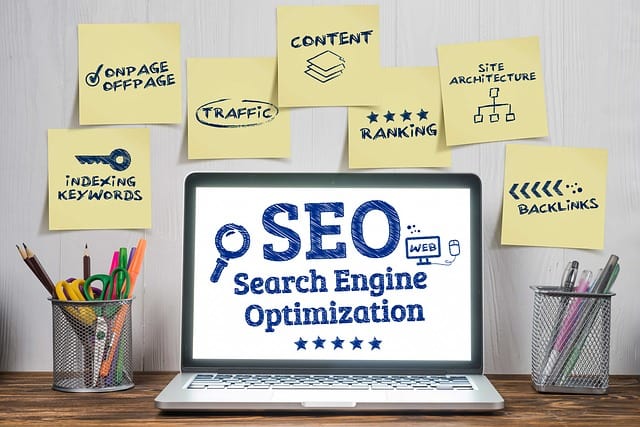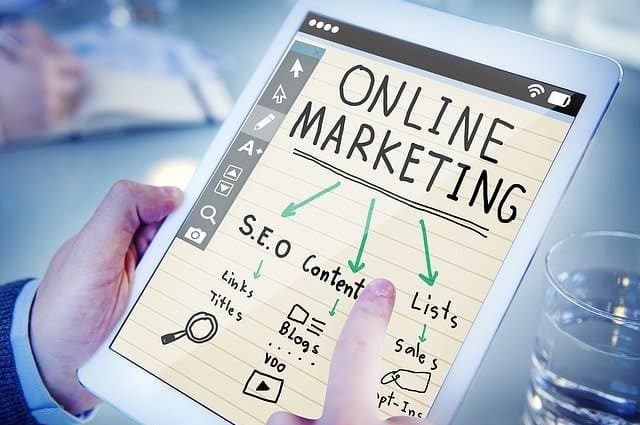Wait, did I just use badass to describe my strategies?
You betcha! Once you figure out how powerful they can be, you’ll be the next one to use this phrasing in your Monday catch-up meeting and turn a few heads!
Is this you?
I am thinking about taking my business digital or maybe doing more to grow my brand awareness and attract customers online? But I am not sure which digital marketing strategies are right for my company or how to implement them.
If you are thinking something along these lines, then you are in the right place! I will take you through 7 effective (badass) digital marketing strategies for SMEs and startups that you can use to improve your online presence. By the way, digital marketing is also commonly referred to as online marketing or internet marketing, don’t worry about the semantics!
Before we discuss these different types of marketing strategies for small businesses, I think I owe my reader full disclosure on four points:
- There is no one-size-fits-all approach to digital marketing – if anyone tells you otherwise and that they have a magic, sure-fire tactic for you, take it from me, it’s time to hightail it out of there! Digital marketing is all about taking the time to really understand a business and how it drives value, and then selecting and using the most suited online tools to demonstrate the business’ unique value to the right target audience in a way that resonates with them. Each of the strategies I will discuss need to be tailored just the right way – it’s what I call bespoke marketing, mainly because my wife is an interior designer, which is all about bespoke solutions.
- A culture of experimentation (aka. not being afraid to fail) is what can really unlock value and success in the digital space – digital marketing is a world of A/B testing and continuous improvement that rewards the brave. Don’t expect to be right the first time, and don’t think that once you find a successful formula it will last forever.
- Yes, I am a digital marketer and, yes, I offer my services for the majority of the discussed strategies. So rather than make this article sneakily sales-y, like the many posts out there, I will just provide a link at the end of each strategy that points to my services. If you would like some help, just click through, learn a bit about what I do and contact me for a personal chat about your business!
- This post is long and detailed with the purpose of providing everything you need to know – a complete intro guide, if you will, to these 7 digital marketing strategies for small businesses. If you don’t have a lot of time now, bookmark the page and come back later, or read one section at a time! Also feel free to skip to any strategy by using the table of contents below.
Now let’s dive into the strategies that can help you grow!
Contents
1. Search Engine Marketing (SEM)

Why use it?
Location, location, location! Deliver adverts at precisely the right moment and place to customers.
What is it?
It is the practice of placing text advertisements in search engine result pages, such as Google or Bing. It’s major USP is that it is the only medium to offer you the chance to deliver ads to a targeted set of customers at exactly the right moment, when they are searching for your products/services on major search engines and are in the market to make a purchase. Companies also love it because it has clear costs (usually works on a PPC, pay-per-click, basis), provides immediate results, and is great for integrating with slower, long-term SEO efforts.
How does it work?
Here’s a simple 4-step guide to getting started:
- Research and understand which keywords customers are using to find your website and which search engines they are using (Google will always be present due to its dominance, but Bing, Yandex and Yahoo can be excellent, cheaper channels if your clients use them)
- Sign up for the search engine’s advertising service (i.e. Google Ads) and bid for the keywords you identified previously. An example: if you sell computers in Budapest, you might bid for a keywords like ‘buy laptop computers Budapest’ or ‘laptops with Nvidia near me’. Beware the different types of keyword match types.
- Create the text ads associated with the keywords – you want to make sure that your advert is relevant, compelling and demonstrate your value to a prospective client. Also remember to target the right geographic locations – no point for our Budapest-based laptop to advertise in Italy if they don’t ship there or don’t have a website in Italian.
- Start your campaign and track the results regularly. Try A/B testing and be flexible with keywords and adverts until you find the right mix that resonates with your customers. Always rely on analytics for optimisation and remember that successful tactics don’t last forever, so be ready to experiment. Good luck with your first campaign!
A final tip
Remember to use dedicated landing pages for your adverts to ensure a focussed message, visual consistency and ultimately improve conversion rates and ROI. Sending users to your homepage is not the best option (especially when you know what they are searching for and are interested in!).
SEM looking daunting? Here’s the link to my services – Click here
2. Content Marketing

Why use it?
To build a strong relationship with your target audience, to become the go-to authority on a subject matter and to drive profitable customer action.
What is it?
Content marketing is all about writing, designing and distributing valuable, relevant content that will resonate with your target audience. It is exactly what I am doing with this blog post you are reading right now!
This is an extremely popular digital marketing strategy for SMEs – I’m sure you’ve seen many blog sections in the top menu bar of websites. Usually there are two major problems which again you must have noticed:
- Companies are not consistent with their content – they create a few pieces of content when they just opened or surrounding a particular event, and then they go silent for long periods of time. Your customers will stop visiting a dead part of your website, so consistency is key!
- You need to market and share your valuable, relevant content with the world – you might have the best articles, ebooks and videos, but they are useless if your target audience is not aware of them. Be sure to SEO optimise your posts, share them on social media and look for websites that might be interested in linking to your content. If you do it right, your audience will take care of the rest and spread your message.
If you have sorted these two issues and are producing valuable, relevant, consistent content that is being picked up by your target audience, then you only have one task left: convince your readers to become customers! Whether you sell your own products/services or you are an affiliate for others’ products/services is up to you!
Just remember to sell softly, be honest and capitalise on the relationship and authority you have created without destroying it – so many webpages lose me when they far too quickly switch to a hard sell and make me doubt their authenticity.
A final tip
Go for quality over quantity and create engaging pieces of content that users want to read, and that search engines want to list! Producing mass amounts of lower-quality content doesn’t cut it and your time is better invested with a quality-first approach.
Content marketing available at €0.05 per word – Interested? Contact me
3. Social Media Marketing

Why use it?
Nearly 3 billion people use social media platforms. It is the best place to connect informally with target customers and build your brand in their eyes.
What is it?
Buffer, a popular social media management tool, defines it perfectly as:
The use of one or more social media platforms to connect with your audience to build your brand, increase sales, and drive website traffic. This involves publishing great content on your social media profiles, listening to and engaging your followers, analysing your results, and running social media advertisements.
Buffer
Currently, the largest social media platforms are Facebook, Instagram, Twitter, LinkedIn, Pinterest, YouTube, and Snapchat. You can pick to work with one or more of these (don’t go overboard in the beginning trying to work with all of them), and make sure to only focus on those where your audience is. For example, there is not much point in concentrating on LinkedIn if you are selling children’s toys!
A few ideas on what you can do with social media:
- Tie it in with your content marketing strategy and share your posts, videos and photos out for free to large audiences
- Run targeted advertising using these data-rich platforms for a large variety of goals (i.e. grow followers, gain brand awareness, increase online sales, remarket to past visitors of your site)
- Give excellent customer support – you might be surprised to know that nearly 70% of consumers use social media for support!
- Showcase your products and drive customers to your website
- Discuss and drive the latest trends in your industry
A final tip
Struggling with what to post? Try creating a marketing persona to help you understand and think like your target customers. Once you step into their shoes, you’ll have a much better chance of knowing what they want to see and read.
Link to my Social Media services – Advertising or Account Management
4. Email Marketing

Why use it?
To build strong customer relationships and nurture key segments making use of a technology that most people check on average 15 times a day.
What is it?
It consists in sending commercial messages via email to your database of email contacts – pretty simple compared to the other strategies we discussed so far!
Email marketing is sometimes referred to as the ‘king of marketing’ due to its effectiveness and very high ROI (up to a huge 440% according to Campaign Monitor). This means that, out of all the digital marketing strategies for small businesses, this is the one that you can’t afford to miss out on.
However, it is also a very easy strategy to get wrong.
How many of us have signed up to an email list only to later regret our decision? I am willing to bet that it is over 90% of us! Whenever engaging with email marketing, think back to all the bad experiences you’ve had and avoid them!
The key to successful email marketing is building and nurturing a trusting, lasting customer relationship with key clients. You do this by respecting their inboxes, sharing only things that they want to read about, and avoiding hard selling techniques. The basic rule is that no one wants to be bombarded by emails filled with crap!
There is no fixed rule on how often you can email your list, as it depends on the nature of the product. Some companies can get away with weekly emails (i.e. sharing weekly highlights), others are better suited for monthly sends (i.e. conferences and events), whilst some choose only to email before big events (i.e. the Christmas Sale). The choice is up to you, but consider your customer’s preferences and monitor your open rates and your click through rates closely, as data never lies!
How does it work?
Here’s a simple 4-step guide to getting started:
- Build an email database by prompting users to join your list through freebies (like an ebook download) or call-to-actions on your website, blog articles, or landing pages. Something like this works: I hope you’ve enjoyed reading my blog post on the best digital marketing strategies for SMEs, please join my list to be amongst the first to hear about new posts!
- Prepare your marketing email using a tool like MailChimp – make sure to keep it short and sweet (people really don’t like to read all that much) and use visually pleasing designs. It is easy with MailChimp’s drag-and-drop editor and its array of templates.
- Write the title – this is so important that I’ve made it its own separate step. Without a strong title, people will not open your email. And if they don’t open it, then all your other efforts will go to waste. Email marketing notoriously has low rates (20-30% is considered successful), so we need to do everything we can to drive more opens! You do this by making sure the title is relevant to the recipient, interesting and grabs their attention quickly. Which of these titles would you rather click?
- Digital Marketing Strategies for SMEs
- John, grow your small business with these 7 badass digital marketing strategies!
- Start sending out your emails based on pre-determined schedule strategy and be sure to carefully review your send analytics. The best way to find out what works for your audience is through A/B testing and experimentation. Good luck on your first campaign!
A final tip
Be more productive by setting up an email automation! You can set it up in a way that it sends personalised emails to your subscribers based on the actions they perform (i.e. sign up to your email list, or make their first purchase).
Link to my Email Marketing services – Available here
5. Search Engine Optimisation (SEO)

Why use it?
To get more organic (free) visits from search engines.
What is it?
Search Engine Optimisation (SEO) is a marketing strategy that aims to improve your website’s ranking on search engine result pages by using a variety of tools and techniques that focus on keywords. Search engines are essentially large databases that have crawled (browsed) the internet and indexed it with the purpose of making it easier for users to find what they are looking for via search terms (keywords). By 2020, they have reached a very refined level of accuracy. With SEO, we help search engines out by making our website closely aligned to what their crawlers (or spiders) are looking for on a webpage and removing any roadblocks that might penalise us.
Done properly, it is a fantastic long-term investment that can guarantee relevant traffic to your website and incredible ROI. I highly recommend it as one of the fundamental digital marketing strategies for small businesses. It does however require a lot of patience and understanding that it is a slow process, as you are likely to only start seeing meaningful results in about one year’s time after optimising. Don’t get discouraged and keep at it!
SEO is quite a complex, technical process so I would recommend speaking to a professional about it, but if you want to give it a go on your own, check out this great 26 point SEO checklist as a guide.
A final tip
Wondering which keywords are the best ones to focus on? Make sure to undertake some detailed keyword research using tools like the Keyword Everywhere Extension, Google Keyword Planner and the MOZ SEO Toolbar. You can use these to find out the number of times people search for a term along with cost and competition information.
Link to my SEO services – Available here
6. Website Optimisation

Why use it?
To improve the digital storefront of your business and get more customers to take the action you desire (increase the conversion rate, in ‘marketing speak’).
What is it?
It is the pratice of constantly reviewing and improving your website on a variety of different factors that will give the user a better experience and lead to more conversions. It is extremely important as your website is the online expression of your business and you have complete ownership and control over it. You don’t have to worry about being limited to templates or changes in layouts or functionality like you do on Facebook or other social media pages.
Show your customers exactly what you want and convince them that you are offering the right value for them.
What are the main areas to optimise?
- SEO – back to point 5 for the details.
- Mobile – make sure your site is mobile-friendly to take advantage of the fact that 51.7% of website traffic originates from mobile devices!
- Speed – your website needs to load quickly as most users leave or bounce if a site doesn’t load within 4 seconds.
- Landing pages – create and test simple, one-purpose pages for all your marketing campaigns to improve conversation rates.
- Ecommerce – if you have an online store, remember to follow ecommerce principles on your site. Here is a list of 10 effective ones that you can implement.
A final tip
I recommend using WordPress (click here to find out the 7 reasons why) and particularly the WP Astra theme to build and managed your website as it gives you a cheap, flexible, quick and mobile-friendly way to do so. If you are already using it (great choice!), you might benefit from seeing my list of top 7 plugins to help with optimising your site.
7. Influencer Marketing

Why use it?
To influence your target customers’ purchasing decisions through an important person’s network and credibility.
What is it?
It is a simple strategy in which you hire or convince an influential person to review, recommend or simply mention your product in their content.
Influencer marketing is gaining importance as people continue to look more and more towards respected and admired personalities for help with purchasing decisions and preferences. This phenomenon was consolidated thanks to people being able to accumulate large number of followers on social media sites.
How does it work?
Here’s a simple 3-step guide:
- Find an influencer with an audience that would be interested in your products / services. For example, if you are selling computers in Budapest, you might want to find a person or website that is a local market leader in providing computer reviews and has a large audience depending on them for advice.
- Contact the influencer and ask them to partner with you. Suggest they do one of the following things: a full product or company review, a recommendation to use your services, or simply briefly mention your product in their content (i.e. an Instagram post showing them enjoying your product and linking back to you). You can convince them by either providing free products or services (i.e. restaurants often give free meals) or by agreeing a fee.
- The influencer writes, speaks or posts about your company to their highly-engaged audience. You should then get increased brand awareness, a spike in leads and/or sales, and, hopefully, new long-term, valuable customers. Be sure to have a tracking system in place, as you will want to monitor performance and only work with successful influencers again! Good luck on your first campaign!
A final tip
It sounds great, Ettore, but who am I supposed to find as an influencer?
You
When most think of influencers, the first people that come to mind are Cristiano Ronaldo or Kim Kardashian. But these are not the type of people you should be looking for. As a small business, you need to focus on finding those people whose opinion is respected and listened to in your industry or niche. Their endorsement will be far more valuable to your business than a generic one from a well-known personality. You can find them by researching your industry on social media platforms or by speaking to colleagues and compiling a list of people (or blogging websites) they go to for advice, suggestions and thought-leadership.
Closing thoughts on the 7 digital marketing strategies for SMEs and startups
If you’ve reached this paragraph without falling asleep, congrats and thank you for reading! 🙂
You are now ready to pick a few of these 7 digital marketing strategies for small businesses and test them out! But always remember my first two points from the introduction section: 1) there is no one-size-fits-all approach to digital marketing and 2) you need to foster a culture of experimentation. With this in mind, pick a few viable options (i.e. no point using Twitter if your audience is not on the platform, or picking content marketing if you don’t have the manpower or budget to create content) and be flexible, be patient and experiment without fear! You’ll then have the right tools to unlock a strategy that has the potential to skyrocket your SME’s growth over the next year!
If you have questions about any of the strategies or have other proven digital marketing strategies for SMEs and startups to recommend, please drop me a comment below and I will get back to you as soon as I can.
If you have enjoyed this article, please share it with your friends and colleagues and don’t forget to join my mailing list to be amongst the first to hear about future blog posts:

